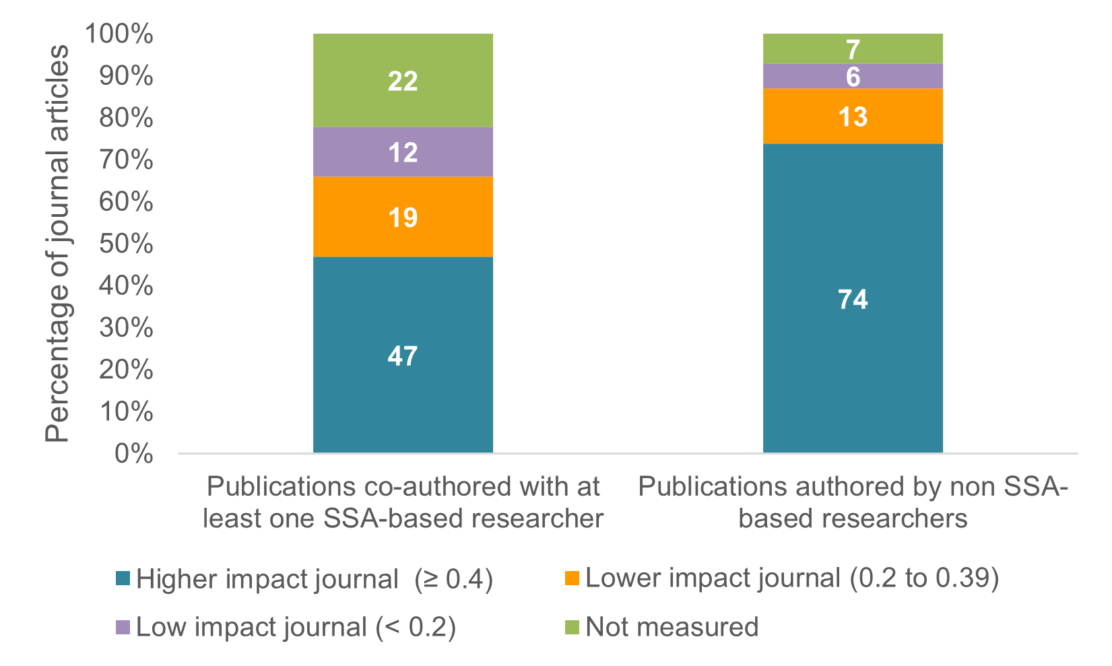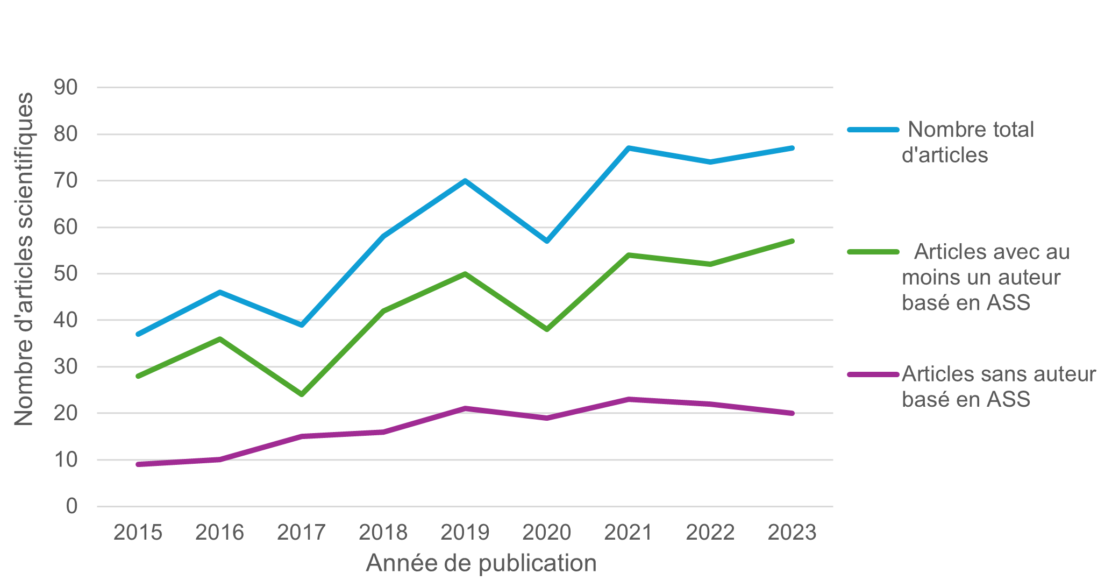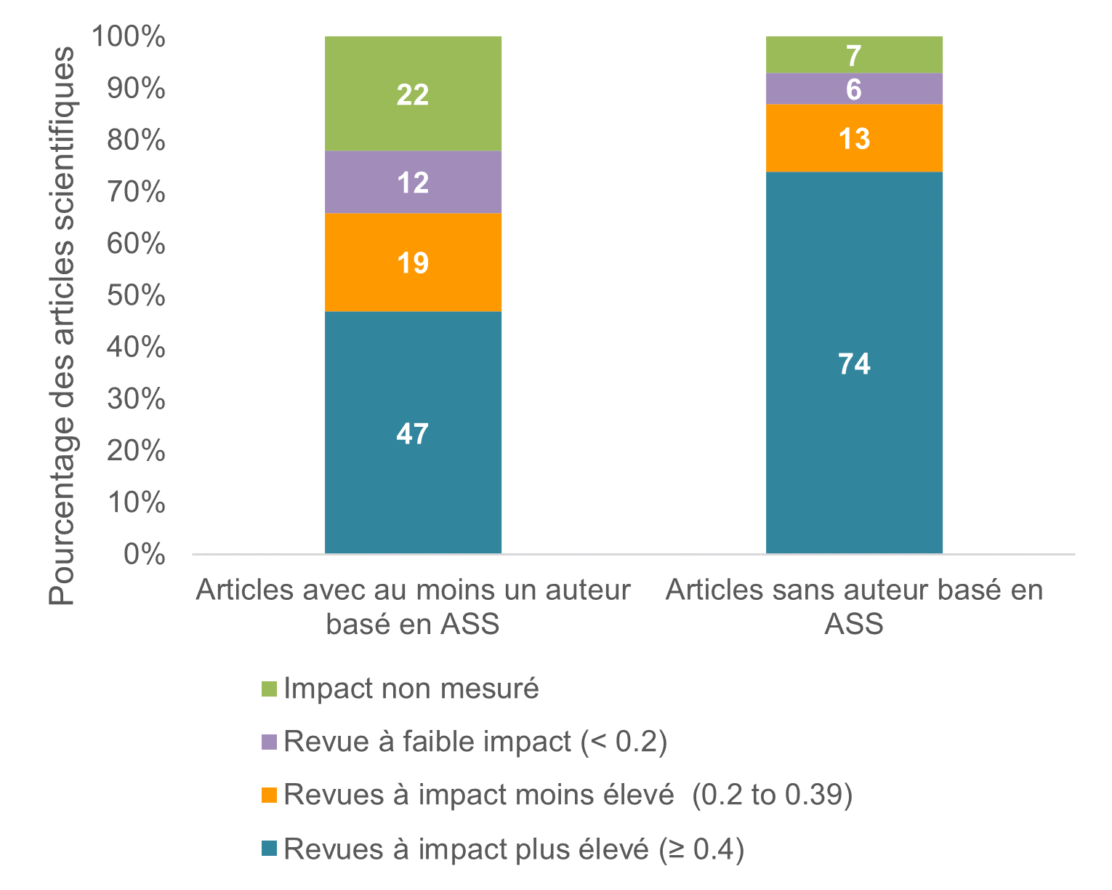Foundational Literacy and Numeracy Research in Sub-Saharan Africa – Collaboration, Impact and Publishing Inequalities
In this blog, which is part of NORRAG’s #TheSouthAlsoKnows blog series, Hélène Binesse explores how African researchers in the field of Foundational Literacy and Numeracy, amongst others, often depend on international collaboration to publish in high-impact journals. Drawing on these persistent inequalities in academic publishing, she reflects on how we, as researchers and practitioners in global education and development, can rethink our citation practices to foster greater inclusivity.
Foundational Literacy and Numeracy (FLN) are crucial for lifelong learning and success, yet in sub-Saharan African (SSA), only one in five children reaches the minimum proficiency level in reading and numeracy by the end of primary education. The need for an evidence base was underscored at the 2022 Transforming Education Summit, which called on global policymakers to enhance FLN learning outcomes. Organisation and government-led initiatives are expanding FLN programmes, and while donor-funded research provides key evidence, local studies and researchers are essential for understanding and addressing context-specific challenges. What FLN research is available from SSA, and where can it be found?
Recognising the importance of African research, Education Sub Saharan Africa (ESSA), the REAL Centre at the University of Cambridge, and the Bill & Melinda Gates Foundation mapped FLN research in SSA. This project aimed to spotlight often overlooked, policy-relevant studies by SSA-based researchers across international, Francophone and Lusophone databases. It also included in-depth searches of research outputs in four countries: Ghana, Kenya, Senegal and Tanzania. This blog focuses on FLN publications retrieved in international databases. More findings can be read in the summary and full report. All reports of the project can be found online.
A Growing Body of FLN Research, Yet Concentrated in Six Countries
Through the mapping, 536 publications were identified over the period 2015 to 2023. Figure 1 shows the growing interest in FLN research within SSA. This increase reflected the global emphasis on addressing challenges related to the quality of education.
What is important in Figure 1 is the green line highlighting the significant contribution of SSA-based researchers to this research domain. Indeed, more than two thirds of 536 FLN publications included an author based in SSA. Twenty-seven years ago, research identified that most research on educational issues in SSA was produced by researchers and consultants from the Global North. Figure 1 illustrates a shift towards publications including an SSA-based author in more recent times. Beginning with 28 publications co-authored by SSA researchers in 2015, the annual number doubled to 57 publications by 2023.

Figure 1. Annual number of publications (2015-2023)
However, the total remains relatively modest. In addition, this body of research is concentrated within six countries – Kenya, Uganda, Nigeria, Ethiopia, Tanzania and Malawi – contributing to 73 percent of the total publications identified. Kenya alone represented 16 percent of the total. Moreover, less than half of the FLN studies were funded, and where funding was available, it predominantly came from the USA and UK, with limited support from African governments.
Where are FLN Studies Published?
Most FLN publications were published in ‘higher impact’ journals, as measured by Scimago SJR index (≥ 0.4). However, a disparity in authorship is clear (Figure 2): nearly three quarters of publications by non-SSA authors were in higher impact journals, while half of SSA co-authored publications appeared in lower impact journals or were not measured. The latter may not be given the same level of credibility. Although the publications in these journals were more likely to be open access, they may still be overlooked and under-utilised.

Figure 2. Impact factor of journals publishing FLN studies by authorship (2015-2023)
The International Journal of Educational Development had the highest number of FLN-related publications, regardless of authorship. Other significant platforms for both SSA and non-SSA authors include Frontiers in Psychology and South African Journal of Childhood Education. Journals like Cogent Education, Revue Internationale d’Education de Sèvres (a Francophone journal not indexed in Scopus, Web of Science, or Dimensions) and Library Philosophy and Practice featured more work co-authored with SSA-based researchers.
What are the ‘Impactful’ FLN Publications?
Citation counts, retrieved in March 2024 from Scopus, Web of Science and Dimensions, provide a gauge of the academic impact and influence of research outputs. Among the most cited works, all were published in ‘higher impact’ journals (≥ 0.4), and 65 percent were open access. The most cited works authored by at least one SSA-based researcher typically involved collaborations with researchers from the Global North and often covered interdisciplinary topics, blending FLN with health issues. Among the top 10 publications involving at least one SSA-based author, Demewoz Haile, Dabere Nigatu, Ketema Gashaw and Habtamu Demelash’s health publication, was the only one co-authored exclusively by SSA-based researchers and funded by an internal institution – Madawalabu University in Ethiopia (see the report for the full list).
Out of the 148 publications authored by at least one SSA-based researcher in higher impact journals, two African journals were included: African Development Review and African Journal of Disability. Only one publication was in French, published in African Development Review. Notably, nearly two thirds of these publications involved collaboration with researchers from the Global North, and 76 percent were funded. For the 57 publications without international collaboration, only 24 were funded, and just 9 received African funding (internal institutions or government funding). This highlights that African researchers often rely on international partnerships to publish in higher impact journals.
Towards a Fairer and More Inclusive Research Environment
As this analysis and other studies highlight, researchers from SSA face significant challenges to publishing in high impact journals, often requiring international collaboration for visibility. The academic publishing system, dominated by a few Global North-based publishers, perpetuates inequalities in access and authorship, with many journals still too often locked behind paywalls, despite efforts to waive the exorbitant fees for low-income countries. Addressing these disparities requires political action and systemic changes within the academic publishing industry.
While organisations like the International Network for the Availability of Scientific Publications (INASP) uses the G20 summits to move toward a shift, transformative approaches are also emerging to counter the dominance of the “Eurocentric, capitalist, and prestige-driven” academic publishing model through findable, accessible, interoperable and re-usable (FAIR) principles of Open Access. The Journal of Community System for Health, a network of researchers from South Africa, Sweden, Tanzania, Uganda and Zambia, seeks to empower researchers and create more inclusive, collaborative spaces for knowledge production.
As individual researchers and practitioners, we too can play a role in fostering a more equitable research landscape. Reflecting on our citation practices, for example, can elevate underrepresented voices. Aurélie Carlier, Hang Nguyen, Lidwien Hollanders, Nicole Basaraba, Sally Wyatt and Sharon Anyango’s recommendations for amplifying female scholars’ work can be applied to marginalised academic communities, including African researchers. We should also strive to engage with and cite research in languages other than English, whenever possible. Tools like the African Education Research Database are instrumental in facilitating access to SSA-based research. By making intentional, responsible choices in our referencing practices, we can contribute to broadening the visibility of African scholarship and fostering equity in the global research community.
The Author:
Hélène Binesse is Research Associate at the Research for Equitable Access and Learning (REAL) Centre, University of Cambridge.
Recherche en apprentissage fondamental en Afrique subsaharienne – collaboration, impact et inégalités en matière de publication
Dans ce blog, Hélène Binesse, associée de recherche au Centre de recherche pour un accès et un apprentissage équitables (REAL) de l’Université de Cambridge, explore comment les chercheurs africains dans le domaine de l’apprentissage fondamental, entre autres, dépendent souvent de la collaboration internationale pour publier dans des revues à fort impact. S’appuyant sur ces inégalités persistantes dans l’édition universitaire, elle réfléchit à la manière dont nous, en tant que chercheur.ses et praticien.nes de l’éducation et du développement international, pouvons repenser nos pratiques de citation pour favoriser une plus grande inclusivité.
Les compétences fondamentales en lecture, écriture et calcul sont cruciales pour l’apprentissage tout au long de la vie et la réussite future, toutefois en Afrique subsaharienne (ASS), seul un enfant sur cinq atteint le niveau minimum de compétence en lecture et en calcul à la fin de l’enseignement primaire. La nécessité d’une base de données probantes a été soulignée lors du Sommet sur la Transformation de l’Éducation de 2022, qui a appelé les décideurs mondiaux à améliorer les résultats d’apprentissage en lecture, écriture et calcul. Les initiatives menées par les organisations et les gouvernements développent les programmes d’apprentissage fondamental, et bien que les recherches financées par les donateurs fournissent des preuves essentielles, les études locales et les chercheurs locaux sont indispensables pour comprendre et relever les défis spécifiques au contexte. Quelles recherches en apprentissage fondamental en Afrique subsaharienne sont disponibles et où peut-on les trouver ?
Reconnaissant l’importance de la recherche africaine, l’Education Sub Saharan Africa (ESSA), le Centre REAL de l’Université de Cambridge et la Fondation Bill & Melinda Gates ont cartographié les publications sur l’apprentissage fondamental en Afrique subsaharienne. Ce projet visait à mettre en avant des études menées par des chercheurs basés en ASS et identifiées dans des bases de données internationales, francophones et lusophones, des études souvent négligées pourtant pertinentes pour les politiques éducatives. Le projet comprenait également une investigation approfondie des travaux de recherche dans quatre pays : le Ghana, le Kenya, le Sénégal et la Tanzanie. Ce blog se concentre sur les publications de l’apprentissage fondamental identifiées dans des bases de données internationales. D’autres conclusions peuvent être lues dans le résumé et le rapport complet (disponible en français). Tous les rapports du projet sont disponibles en ligne.
Un corpus de publications sur l’apprentissage fondamental croissant mais concentré dans six pays
Grâce à la cartographie, 536 articles scientifiques ont été identifiées sur la période de 2015 à 2023. La figure 1 montre l’intérêt croissant pour la recherche en apprentissage fondamental au sein de l’ASS. Cette augmentation reflète l’accent mis à l’échelle mondiale sur la résolution des problèmes liés au défi de la qualité de l’éducation.
Ce qui est important dans la figure 1, c’est la ligne verte qui met en évidence la contribution significative des chercheurs basés en ASS dans ce domaine de recherche. En effet, plus des deux tiers des 536 articles sur l’apprentissage fondamental comprenaient au moins un auteur basé en ASS. Il y a vingt-sept ans, une étude révélait que la plupart des recherches sur les questions d’éducation en ASS étaient produites par des chercheurs et des consultants du Nord global. La figure 1 illustre une évolution plus récente vers des articles incluant un auteur basé en ASS. De 28 articles co-écrits par des chercheurs subsaharien en 2015, le nombre annuel a doublé pour atteindre 57 articles en 2023.

Figure 1. Nombre annuel de publications (2015-2023)
Cependant, le total reste relativement modeste. En outre, ce corpus de publications est concentré dans six pays – le Kenya, l’Ouganda, le Nigeria, l’Éthiopie, la Tanzanie et le Malawi – contribuant à 73 % du total des articles identifiés. Le Kenya représentait à lui seul 16 % du total. Par ailleurs, moins de la moitié des études sur l’apprentissage fondamental a été financée, et lorsque des fonds étaient disponibles, ils provenaient principalement des États-Unis et du Royaume-Uni, avec un soutien limité des gouvernements africains.
Où sont publiées les études sur l’apprentissage fondamental ?
La plupart des articles sur l’apprentissage fondamental ont été publiés dans des revues à « impact plus élevé », comme le mesure l’indice Scimago SJR (≥ 0,4). Cependant, une disparité dans les auteurs est évidente (figure 2): près des trois quarts des articles écrits par des auteurs basés hors ASS ont été publiés dans des revues à impact plus élevé, tandis que la moitié des articles co-écrits par des auteurs subsahariens a été publiée dans des revues à faible impact ou dont l’impact n’est pas mesuré. Ces dernières peuvent ne pas avoir le même niveau de crédibilité. Même si les articles de ces revues étaient plus susceptibles d’être en libre accès, ils restent souvent négligés et sous-utilisés.

Figure 2. Facteur d’impact des revues publiant des études sur l’apprentissage fondamental par auteur (2015-2023)
La revue International Journal of Educational Development a enregistré le plus grand nombre d’articles liés à l’apprentissage fondamental, quel que soit l’auteur. Parmi les autres plateformes importantes pour les auteurs basés en ASS et hors ASS, citons Frontiers in Psychology et South African Journal of Childhood Education. Des revues comme Cogent Education, la Revue Internationale d’Education de Sèvres (une revue francophone non indexée dans Scopus, Web of Science ou Dimensions) et Library Philosophy and Practice ont présenté plus d’études co-écrites avec des chercheurs basés en ASS.
Parmi ces articles, lesquels sont dits « impactants » ?
Le nombre de citations, capturé en mars 2024 à partir de Scopus, Web of Science et Dimensions, donne une idée de l’impact et de l’influence académiques des publications. Parmi les articles les plus cités, tous ont été publiés dans des revues à « impact plus élevé » (≥ 0,4), et 65 % étaient en libre accès. Les travaux les plus cités, rédigés par au moins un chercheur basé en ASS, impliquaient généralement des collaborations avec des chercheurs du Nord global et couvraient souvent des sujets interdisciplinaires, mêlant l’apprentissage fondamental aux questions de santé. Parmi les 10 premiers articles impliquant au moins un auteur basé en ASS, l’article en santé de Demewoz Haile, Dabere Nigatu, Ketema Gashaw et Habtamu Demelash a été le seul co-écrit exclusivement par des chercheurs basés en ASS et financé par une institution interne – l’Université Madawalabu en Éthiopie (voir le rapport pour la liste complète).
Sur les 148 articles rédigés par au moins un chercheur basé en ASS et publiés dans des revues à impact plus élevé, deux revues africaines ont été comptabilisées : African Development Review et African Journal of Disability. Un seul article était en français, publié dans la revue African Development Review. Plus spécifiquement, près des deux tiers de ces études impliquaient une collaboration avec des chercheurs du Nord global, et 76 % ont été financées. Sur les 57 articles sans collaboration internationale, seuls 24 ont été financés, et seulement 9 ont reçu des financements africains (institutions internes ou financements gouvernementaux). Cela met en évidence le fait que les chercheurs africains dépendent souvent des partenariats internationaux pour publier dans des revues à plus fort impact.
Vers un environnement de recherche plus juste et plus inclusif
Comme le soulignent cette analyse et d’autres études, les chercheurs subsahariens sont confrontés à des défis importants pour publier dans des revues à fort impact, nécessitant souvent une collaboration internationale pour être visibles. Le système de publication universitaire, dominé par quelques éditeurs basés dans les pays du Nord, perpétue les inégalités d’accès et d’auteur, de nombreuses revues étant encore trop souvent enfermées derrière des murs payants, malgré les efforts déployés pour renoncer aux frais exorbitants pour les pays à faible revenu. Remédier à ces disparités nécessite des mesures politiques et des changements systémiques au sein de l’industrie de l’édition universitaire.
Alors que des organisations comme le Réseau international pour la disponibilité des publications scientifiques (INASP) utilisent les sommets du G20 pour avancer vers un changement, des approches transformatrices émergent également pour contrer la domination du modèle de publication académique « eurocentrique, capitaliste et axé sur le prestige » grâce aux principes FAIR (facile à trouver, accessible, interopérable et réutilisable) de l’Open Access. La revue en santé Journal of Community System for Health, créée par un réseau de chercheurs d’Afrique du Sud, de Suède, de Tanzanie, d’Ouganda et de Zambie, cherche à autonomiser les chercheurs et à créer des espaces plus inclusifs et collaboratifs pour la production de connaissances.
En tant que chercheur.ses et praticien.nes, nous pouvons nous aussi jouer un rôle dans la promotion d’un paysage de recherche plus équitable. Réfléchir à nos pratiques de citation, par exemple, peut élever les voix sous-représentées. Les recommandations d’Aurélie Carlier, Hang Nguyen, Lidwien Hollanders, Nicole Basaraba, Sally Wyatt et Sharon Anyango pour amplifier le travail des chercheuses peuvent être appliquées aux communautés universitaires marginalisées, y compris les chercheur.ses africain.es. Dans la mesure du possible, nous devrions également nous efforcer de nous engager et de citer la recherche dans des langues autres que l’anglais. Des outils tels que la base de données sur la recherche en éducation en Afrique sont essentiels pour faciliter l’accès à la recherche subsaharienne. En faisant des choix intentionnels et responsables dans nos pratiques de référencement, nous pouvons contribuer à élargir la visibilité de la recherche africaine et à favoriser l’équité dans la communauté mondiale de la recherche.
L’auteure :
Hélène Binesse est associée de recherche au Centre de recherche pour un accès et un apprentissage équitables (REAL) de l’Université de Cambridge.

